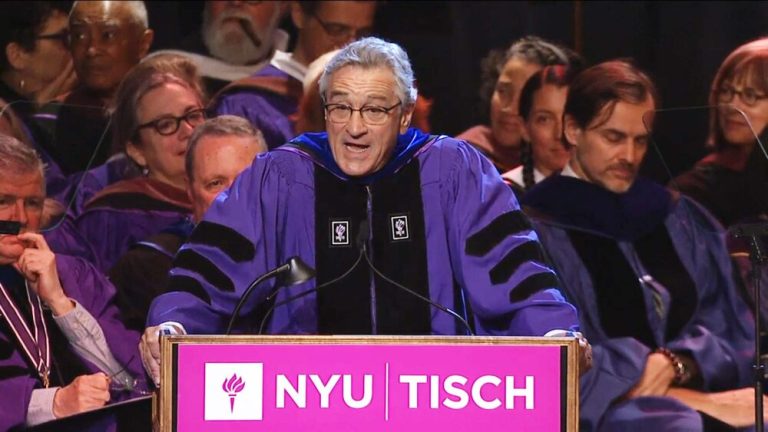When it comes to the arts, passion should always trump common sense.
American actor Robert De Niro delivered a frank, funny and thought-provoking speech to the 2015 graduating class of NYU Tisch School of the Arts. He spoke about the challenges of being an artist, the ups and downs, the roller coaster, what it takes and eventually the triumph.
Dean Green, deans, University Leadership, faculty, staff, parents, friends, and the 2015 class of New York University’s TISCH School of the Arts.
Thank you for inviting me to celebrate with you today. TISCH graduates, you made it!
And you’re fucked. Think about that. The graduates from the college of nursing, they all have jobs. The graduates from the college of dentistry, fullyemployed. The Leonard M Stern School of Business graduates, they’re covered. The School of Medicine graduates, each one will get a job. The proud graduates of the NY School of Law, they’re covered, and if they’re not, who cares? They’re lawyers. The English majors are not a factor. They’ll be home writing their novels. Teachers, they’ll all be working. Shitty jobs, lousy pay, but still working. The graduates in accounting they all have jobs. Where does that leave you? Envious of those accountants, I doubt that. They had a choice. Maybe they were passionate about accounting, but I think it’s more likely that they used reason and logic and common sense to reach for a career that could give them the expectation of success and stability. Reason, logic, common sense? At the TISCH School of Arts? Are you kidding me?
But you didn’t have that choice, did you? You discovered a talent, recognised your ambition and developed a passion. When you feel that you can’t fight it, you just go with it. When it comes to the arts, passion should always trump common sense. You aren’t just following dreams, you’re reaching for your destiny. You’re a dancer, a singer, a choreographer, a musician, a film maker, a writer, a photographer, a director, a producer, an actor, an artist. Yeah, you’re fucked!
When it comes to the arts, passion should always trump common sense.
The good news is that that’s not a bad place to start. Now that you’ve made your choice, or rather, succumbed to it, your path is clear. Not easy but clear. You have to keep working, it’s that simple. You got through TISCH, that’s a big deal, or to put it another way, you got through TISCH, big deal. Well it’s a start. On this day of triumphantly graduating a new door is opening for you. A door to a lifetime of rejection. It’s inevitable. It’s what graduates call the ‘the real world’. You’ll experience it auditioning for a part or a place in a company. It’ll happen to you when you’re looking for backers for a project. You’ll feel it when door close on you when you’re trying to get attention for something you have written, and when you’re looking for a directing or choreographing job.
How do you cope with it? I hear that valium and vicodin work! Nyah, I dunno. You can’t be too relaxed when you do what we do. And you don’t wanna block the pain too much. Without the pain, what would we talk about. I would make an exception to having a couple of drinks, if hypothetically, you had to speak to a couple of thousand graduates and their families at a commencement ceremony. [takes swig]
Rejection might sting, but my feeling is that it often has very little to do with you. When you’re auditioning or pitching the director or producer or investor might just have something or someone different in mind, that’s just how it is. That happened to me recently when I audtioned for the role of Martin Luther King in Selma. Which is too bad because I could have played the hell out of that part. I felt it was written for me. But the director had something different in mind. And you know, she was right. It seems the director is always right. Don’t get me wrong, David O’Yelowo was great. I don’t think I would have cast it great ..
I got two more stories, these really happened.
I read for Bang The Drum Slowly, seven times. The first two of the three times I read for the part of Henry Wiggins, the part eventually played by Michael Moriaty. I read for the director, I read for the producer, then they had me back to read for another part, the role of Bruce Pearson, I read for the director, I read for the producer, I read for the producer and his wife, I read for all of them together. It was almost like as long as I kept auditioning, they would have time to find somebody they liked more. I don’t know exactly what they were looking for, but I’m glad I was there when they didn’t find it.
Another time I was auditioning for a play, they kept having me back and I was pretty sure I had the part, and then they went with a name. I hated losing the job, but I understood.
I could just as easily have lost the job to another no name actor, and I also would have understood. It’s just not personal. It can just mean nothing more than the director having another type in mind. You’ll get a lot of direction in your careers, some from directors, some from studio heads, some from money people, some from writers, although usually they’ll try to keep the writer at a distance. And some from your fellow artists. I love writers, by they way, I keep them on the set all the time.
Listen to all of it, and listen to yourself. I’m mostly going to talk about these ideas in movie actor terms, but this applies to all of you. You’ll find comparable situations in all the disciplines. The way the director gets to be right is that you help him or her be right. You may start out with different ideas, the director will have a vision, you will have ideas about your character. When you’re a young actor starting out, your ideas might not be trusted as much they will be later on in your career. You’ve been hired because the director saw something in your audition, your reading, in you that fit they’re concept. You may be given the opportunity to try it your way, but the final decision will be the director’s.
Later in your career when there’s a body of work to refer to, the may be more trust from the director but it’s pretty much the same thing. You may have more opportunities to try things your way, and you may think the director has agreed to your take, agreed your take is the best, but if it’s a movie, you’ll be nowhere near the editing room when the director makes the final decision. It’s best when you can work it out together.
As an actor, you always want to be true to your character and be true to yourself. But the bottom line is, you got the part. And that’s very important. As a director ora producer you also have to be true to yourself, and to the work. A film a dance a play, they are not tents where artists gets to play and express their individuality, they’re works of art that depend upon the contributions and collaboration of a group of artists. And it’s a big group, that includes production and costume designers, directors of photography, makeup and hair, stage managers, assistant directors, choreographers et cetera et et cetera many more I could name but I won’t now. Everyone plays an important part, an essential part. A director, producer, choreographer or company artistic director – these are powerful positions. But the power doesn’t come from the title. The power doesn’t come from the title, the power come from trust, respect, vision, work and again collaboration. You’ll probably be harder on yourself than any director. I’m not going to tell you to go easy on yourselves, I assume you didn’t pick this life because you thought it would be easy. You may have to answer to a director for a job but you also have to answer to yourself.
This could create conflicts for you. You may want to play the role your way and the director has a different idea. Discuss it with the director, maybe there’s a compromise, there always should be the space to try to both ways. But don’t make … don’t make a production … but don’t make … [pauses – smiles] but don’t make a production out of it because it’s not a democracy. On the set, or on the stage, somebody has to make the final decision. Someone has to pull it all together – that’s the director. So don’t be obdurate. Nobody’s going to see you do it in the‘right way’ if you’re not on stage or in the movie.
I can answer the question that is on all of your minds right now. Yes, it’s too late to change your major to directing. While preparing for my role today, I asked a few TISCH students for directions for this speech. The first thing they said was keep it short. And they said it’s okay to give a bit of advice, it’s kind of expected and no one will mind. And then they said, to keep it short.
It’s difficult for me to come with advice for you who have already set upon your life’s work, but I can tell you some of the things I tell my own children. First, whatever you do, don’t go to TISCH School of the Arts. Get an accounting degree instead.
Then I contradict myself, and as corny as it sounds, I tell them don’t be afraid to fail. I urge them to take chances, to keep an open mind, to welcome new experiences and new ideas. I tell them that if you don’t go, you’ll never know. You just have to be bold and go out there and take your chances. I tell them that if they go into the arts, I hope they find a nurturing and challenging community of like minded individuals, a place like TISCH. If they find themselves with the talent and the burning desire to be in the performing arts, I tell them when you collaborate, you try to make everything better but you’re not responsible for the entire project, only your part in it. You’ll find yourself in movies or plays or concerts or dance pieces that turn out in the eyes of critics and audiences to be bad, but that’s not on you, because you will put everything into everything that you do. You won’t judge the characters you play, and shouldn’t bedistracted by judgments on the works you are in. Whether you are working for Ed Wood of Federico Fellini or Martin Scorsese, your commitment to your process will be the same.
By the way there will be times when your best is not enough. There can be many reasons for this, but as long as you give your best, it’ll be okay.
By the way there will be times when your best is not enough. There can be many reasons for this, but as long as you give your best, it’ll be okay. Did you get straight As at school? If so, good for you, congratulations, but in the real world you’ll never get straight As again. There are ups and there are downs. And what I want to say to you today is that it’s okay. Instead of rocking caps and gowns today I can see all of you graduating today in custom TSOA T-shirts. On the back is printed, ‘Rejection – it isn’t personal’. And on the front – your motto, your mantra, your battle cry, ‘Next!’ You didn’t get that part, that’s my point, ‘Next’, you’ll get the next one, or the next one after that. You didn’t get that waiter’s job at the White Oak tavern, next! You’ll get the next one, or you’ll get the next gig tending bar at Joseph’s. You didn’t get into Juilliard? Next! You’ll get into Yale or TISCH. You guys like that joke, so it’s okay.
No, of course choosing TISCH is like choosing the arts. It isn’t your first choice, it’s your only choice. I didn’t attend TISCH or for that matter any college, or my senior year of high school, or most of my junior year … still I’ve felt like part of the TISCH community for a long time. I grew up in the same neighborhood as TISCH. I’ve worked for a lot of people who have attended TISCH, including Marty Scorsese, Class of ’64. As you learn your craft together you come to trust each other and depend on each other. This encourages taking creative risks, because you all have the sense that you’re in it together. It’s no surprise that we often work with the same people over and over. I did eight pictures with Marty, and plan to do more. He did about twenty five with his editor, Thelma Schoonmaker, whom he met at TISCH when she worked on his student film in the summer of ‘63. Other directors – Cassavetes, Fellini, Hitchcock, came back to the same collaborators over and over, almost like a repertoire company. And now David O Russell and Wes Anderson are continuing that tradition.
Treasure the associations and friendships and working relationships with the people in your classes in your early work. You never know what might come from them. There could be a major creative shift or a small detail that could make a major impression. In Taxi Driver, Marty and I wanted Travis Bickle to cut his hair into a mohawk. An important character detail, but I couldn’t do it because I needed long hair for The Last Tycoon that was starting right after Taxi Driver, and we knew a false Mohawk would look, well, false. So we were kicking it around one day at lunch and we decided to give it one shot with the very best makeup artist at the time, Dick Smith. If you saw the movie, you’ll know that it worked. And by the way, now you know it wasn’t real.
Friendships, good working relationships, collaboration, you just never know what’s going to happen when you get together with your creative friends. Marty Scorsese was here last year to speak to your 2014 graduates. And now here I am, here we are, on Friday, at a kind of super sized version of one of Alison’s student lounge hangout sessions. You’re here to pause and celebrate your accomplishments so far, as you move on to a rich and challenging future. And me – I’m here to hand out my picture and resume to the directing and producing graduates.
I’m excited to be in a room of young creatives who make me hopeful about the future of the performing and media arts and I know you’re going to make it, all of you. Break a leg!
Next!
Thank you.



Comments are closed.